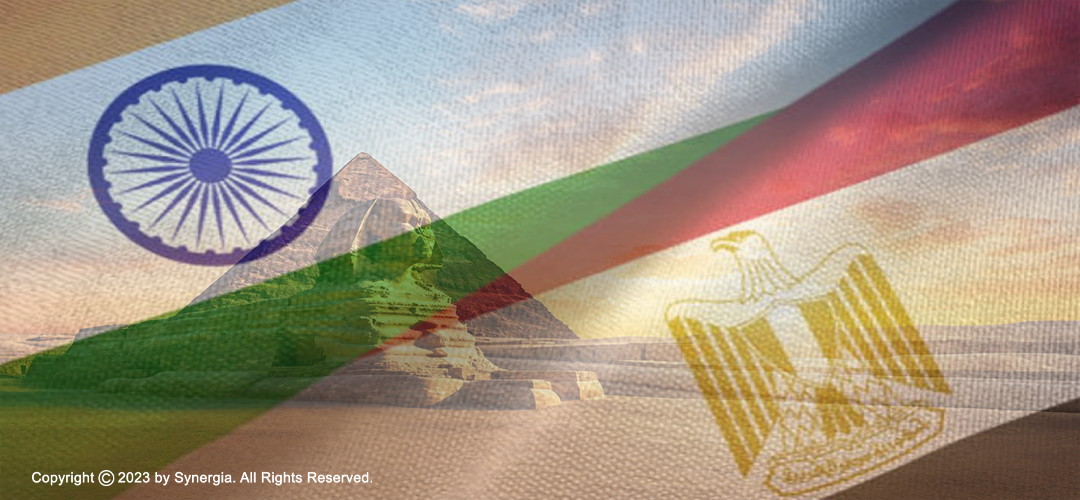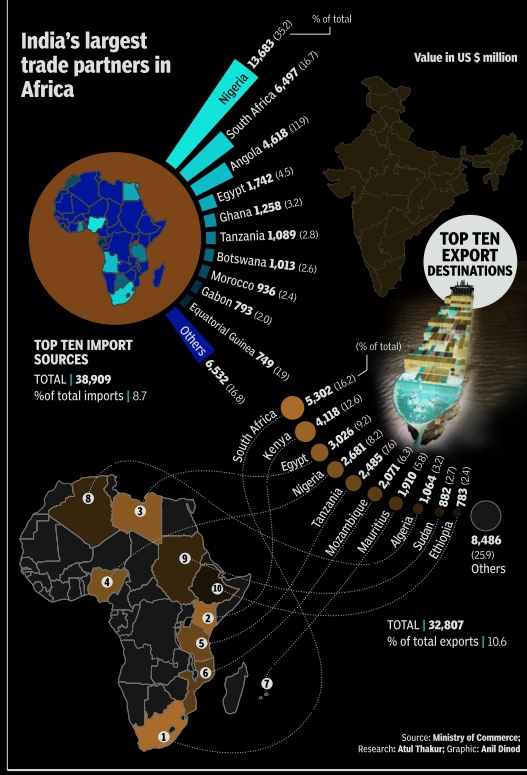A Civilisational Affinity
July 1, 2023 | Expert Insights

Since its independence, relations with the countries of the Global South have been very important for India. These countries are critical for India in more ways than one. Out of these countries, a select few have a special place in New Delhi's heart. They are like-minded powers with India in many respects. There are certain commonalities between their situation and India’s.
Egypt is one such country. It is a bridgehead for India into Africa and the Middle East.
On his return from Washington, the Indian Prime Minister made a short visit to Egypt, the first by an Indian Prime Minister since 1997. This was a visit that was long due considering that the Egyptian President Abdel Fateh el-Sisi has already visited India thrice, including as the Chief Guest for this year's Republic Day Parade and is expected to attend the G-20 summit scheduled later this year. This flurry of top-level visits indicates the trajectory of the relationship.
While Egypt eyes increasing India’s investment in the country, New Delhi would like deeper access to the Middle East and North Africa (MENA) region through Cairo.
Background
The Egypt-India relationship can be traced back to our modern history post-independence. Anti-colonialism and the fight against imperialism were the common bonds that brought these two countries together. The Indian independence movement inspired republicans in Egypt. There was correspondence between the two sides even back then; Egypt was a crucial link for Britain to protect its Indian empire.
When India and Egypt became free, both countries faced the same challenges. Due to their geostrategic location, both countries were wooed by the Soviets and the Americans during the Cold War. In Egypt, this led to a nationalist revolution by the armed forces. In India, the non-aligned foreign policy was formulated in response to the external environment. Egyptians, too, began to get interested in non-alignment.
So, both India and Egypt began to champion the cause of the Third World during the Cold War. But after the 1973 Arab-Israel war, things slowly began to change. Egypt started moving more towards the Western bloc, while India remained tilted towards the Soviet Union. The two countries gradually started to drift apart from each other.
This geostrategic divergence between India and Egypt continued in the post-Cold War era. For the Egyptian regime of Hosni Mubarak, its relationship with America was its main lifeline. However, the international order was slowly changing. As American power has declined and a multipolar world emerges, individual countries are seeking more bilateral relationships.
India and Egypt were also going through their own significant domestic political changes. A new government brought in a more decisive foreign policy for India Egypt was going through the convulsions of the Arab Spring.
2014 was to be the turning point year for both India and Egypt. Both countries finally had stable, forward-looking governments. Egypt was seeking to diversify its relationships; so was India.
The global environment had also become more unpredictable and unreliable First, there was the unrest in the Middle East caused by the rise of the Islamic State Egypt felt the direct impact of this in the unstable Sinai Peninsula. The new military government was attempting to establish its authority against this threat. India, too, felt the scourge of the Islamic State (IS) phenomenon indirectly. The IS set up a local branch in the subcontinent. A few Indians travelled to the Middle East to join the IS. New Delhi felt the need to work with Middle Eastern countries to meet this common challenge.
Then the Covid-19 pandemic hit the world in 2020. This especially had a grave impact on middle-income countries. Worldwide the tourism sector was hit in a big way. Egypt is an economy that relies to a large degree on the proper functioning of its tourism sector. As a result, it suffered a serious economic contraction. Apart from this, there was the issue of dealing with the health effects of the pandemic itself. Large-scale vaccination was necessary. For this, a large supply of vaccines was required, and Egypt was not receiving sufficient quantities of vaccines from outside. This is where India came to its rescue by offering to supply its home-made vaccines in substantial quantities.
The disruption of the food supply chains by the Russia-Ukraine war created critical food shortages in Egypt. Here again, India stood by Egypt's side. New Delhi decided to supply a part of its excess wheat stock to Cairo.

Analysis
Today India and Egypt face many common challenges. This includes economic development, climate change and the fight against terrorism. As a Muslim-majority country, Egypt has its own obligations, and this would explain its absence from the G-20 meeting on tourism in Srinagar. Both India and Egypt acknowledge these compulsions and have tried to bypass or overlook them.
This time around, the Indo-Egyptian relationship will not be ideological in nature. Instead, it will be based on common interests. A strong and prosperous Egypt is good for India and vice versa. Unlike Western powers, India does not impose any conditionalities in its relationships. This is a partnership between equals. Minor differences did not hamper this partnership last time around. This time also, the points of convergence are too many to be ignored. Two middle powers in strategic locations are joining hands at a crucial time in world history.
There have been many takeaways from this short visit of the Indian Prime Minister. Symbolically the PM was honoured with the highest civilian honour of Egypt. Four key agreements were signed; a strategic partnership was formalised; focus was given on future collaboration between the two sides; emphasis was placed here on renewable and green energy and resiliency in these areas will determine the odds in the current and future fight against climate change. The strategic partnership agreement means that a more comprehensive cooperation can take place between India and Egypt at all levels. Areas where MoUs were signed include agriculture, archaeology and competition law.
India figures as Cairo’s 7th largest trading partner ($7 billion) and both sides expect it to increase exponentially in the next few years. Egypt has proposed “dedicated land area for Indian industries in the Suez Canal Economic Zone” and a mega green hydrogen plant to be built by India costing $12 billion.
Food and energy security were also discussed. The Egyptian cabinet has a special “India Unit” which deals specifically with India. This shows the importance the Egyptian government places on its growing relationship with India.
On the geopolitical stage, the visit is designed to upgrade the relationship with Egypt’s potential entry into the BRICS with Indian sponsorship.
A number of challenges remain in the continuing evolution of the Indo-Egyptian relationship. The Indian and Egyptian economies are still not in total sync with each other. Indian businesses want to invest heavily in Egypt, but they are facing many bottlenecks. This is mainly due to the red tape in the bureaucracies of both the countries. This must be sorted out as quickly as possible. Military cooperation between the Indian and Egyptian armed forces is already taking place at many levels; Egypt is an important node in the security of the wider Indo-Pacific.
Assessment
- The Indo-Egyptian relationship is on an upward trajectory. This is not going to be a relationship based on a single issue or on short-term interests. Instead, it is going to be based on a long-term convergence of interests.
- Memories of the non-aligned relationship between India and Egypt in the past will help. But it will not be the basis for the present partnership.
- Middle powers like India and Egypt will play an important role in determining the future of the world. Both have to step up to the plate both within their own region and beyond to strengthen a multipolar world, away from blocs and alliances.








Comments